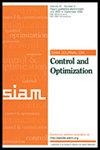The Nonlocal Kelvin Principle and the Dual Approach to Nonlocal Control in the Conduction Coefficients
IF 2.4
2区 数学
Q2 AUTOMATION & CONTROL SYSTEMS
引用次数: 0
Abstract
SIAM Journal on Control and Optimization, Volume 62, Issue 1, Page 487-508, February 2024.Abstract. We explore the dual approach to nonlocal optimal control in the coefficients, specifically for a classical min-max problem which in this study is associated with a nonlocal scalar diffusion equation. We reformulate the optimal control problem utilizing a dual variational principle, which is expressed in terms of nonlocal two-point fluxes. We introduce the proper functional space framework to deal with this formulation and establish its well-posedness. The key ingredient is the inf-sup (Ladyzhenskaya–Babuška–Brezzi) condition, which holds uniformly with respect to small nonlocal horizons. As a by-product of this fact, we are able to prove convergence of nonlocal optimal control problems toward their local counterparts in a straightforward fashion.
非局部开尔文原理和传导系数非局部控制的双重方法
SIAM 控制与优化期刊》第 62 卷第 1 期第 487-508 页,2024 年 2 月。 摘要我们探讨了系数中的非局部最优控制的对偶方法,特别是经典的最小-最大问题,在本研究中该问题与非局部标量扩散方程相关。我们利用对偶变分原理重新表述优化控制问题,该原理用非局部两点通量表示。我们引入了适当的函数空间框架来处理这一表述,并建立了其良好拟合性。其中的关键要素是 inf-sup (Ladyzhenskaya-Babuška-Brezzi) 条件,该条件对小的非局部水平均匀成立。作为这一事实的副产品,我们能够以直接的方式证明非局部最优控制问题向其局部对应问题的收敛性。
本文章由计算机程序翻译,如有差异,请以英文原文为准。
求助全文
约1分钟内获得全文
求助全文
来源期刊
CiteScore
4.00
自引率
4.50%
发文量
143
审稿时长
12 months
期刊介绍:
SIAM Journal on Control and Optimization (SICON) publishes original research articles on the mathematics and applications of control theory and certain parts of optimization theory. Papers considered for publication must be significant at both the mathematical level and the level of applications or potential applications. Papers containing mostly routine mathematics or those with no discernible connection to control and systems theory or optimization will not be considered for publication. From time to time, the journal will also publish authoritative surveys of important subject areas in control theory and optimization whose level of maturity permits a clear and unified exposition.
The broad areas mentioned above are intended to encompass a wide range of mathematical techniques and scientific, engineering, economic, and industrial applications. These include stochastic and deterministic methods in control, estimation, and identification of systems; modeling and realization of complex control systems; the numerical analysis and related computational methodology of control processes and allied issues; and the development of mathematical theories and techniques that give new insights into old problems or provide the basis for further progress in control theory and optimization. Within the field of optimization, the journal focuses on the parts that are relevant to dynamic and control systems. Contributions to numerical methodology are also welcome in accordance with these aims, especially as related to large-scale problems and decomposition as well as to fundamental questions of convergence and approximation.

 求助内容:
求助内容: 应助结果提醒方式:
应助结果提醒方式:


